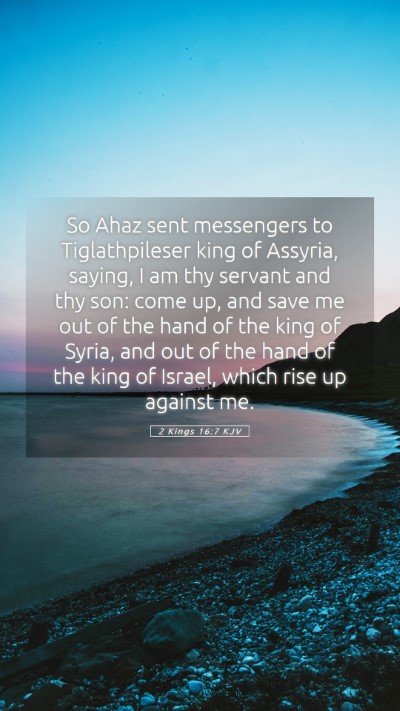Old Testament
Genesis Exodus Leviticus Numbers Deuteronomy Joshua Judges Ruth 1 Samuel 2 Samuel 1 Kings 2 Kings 1 Chronicles 2 Chronicles Ezra Nehemiah Esther Job Psalms Proverbs Ecclesiastes Song of Solomon Isaiah Jeremiah Lamentations Ezekiel Daniel Hosea Joel Amos Obadiah Jonah Micah Nahum Habakkuk Zephaniah Haggai Zechariah Malachi2 Kings 16:7 Meaning
What is the meaning of 2 Kings 16:7?
So Ahaz sent messengers to Tiglathpileser king of Assyria, saying, I am thy servant and thy son: come up, and save me out of the hand of the king of Syria, and out of the hand of the king of Israel, which rise up against me.
2 Kings 16:7 Bible Verse Meaning
Bible Verse Commentary: 2 Kings 16:7
Verse: "So Ahaz sent messengers to Tiglath-Pileser king of Assyria, saying, 'I am your servant and your son. Come up, and save me from the hand of the king of Syria and from the hand of the king of Israel, who rise up against me.'" (2 Kings 16:7, NKJV)
Understanding 2 Kings 16:7
This verse presents a critical interaction between Ahaz, the king of Judah, and Tiglath-Pileser, the king of Assyria. It illustrates Ahaz's desperation and political maneuvering in seeking external assistance against his enemies. The implications of this action and its context offer rich insights for Bible study.
Historical Context
The historical backdrop of this verse is crucial for its understanding. Ahaz ruled during a tumultuous time when Judah faced threats from both Israel (the northern kingdom) and Aram (Syria). In his vulnerability, Ahaz chose to seek help from Assyria, a powerful nation, rather than relying on God for deliverance.
Commentary Insights
- Matthew Henry: Henry emphasizes that Ahaz’s plea to Tiglath-Pileser illustrates a lack of faith in God's protection. It shows the king's shift from reliance on divine aid to human alliances, which the commentary suggests was a fundamental error on Ahaz's part.
- Albert Barnes: Barnes explores the ramifications of Ahaz's decision, arguing that by declaring himself a servant to the king of Assyria, Ahaz placed Judah under foreign servitude, revealing a tragic compromise of national integrity and faith.
- Adam Clarke: Clarke notes the political implications of this verse, where Ahaz's actions represent a broader trend of seeking aid from worldly powers instead of the living God. He details the consequences that arise from such choices, both personally and nationally.
Spiritual Lessons and Applications
The verse invites readers to reflect on their own decisions in times of crisis. Ahaz's reliance on Assyria serves as a cautionary tale against seeking worldly solutions over spiritual ones. Believers are encouraged to trust in God's providence and seek His guidance rather than resorting to earthly authorities.
Key Learnings:
- The importance of faith and trust in God during difficulties.
- The risks associated with forming alliances that compromise one’s spiritual integrity.
- Recognition of God's sovereignty, even when external help seems appealing.
Related Bible Verses
- Isaiah 7:1-13 – Depicts the context of Ahaz’s fear and the prophetic message he received.
- 2 Kings 15:29 – Discusses the actions of Tiglath-Pileser in relation to Israel.
- Psalm 20:7 – Emphasizes the futility of trust in human resources compared to divine help.
Conclusion
The examination of 2 Kings 16:7 through the lenses of various commentaries illustrates the profound implications of Ahaz's choices. It serves as a reminder of the significance of seeking God's intervention and maintaining faith, even amidst overwhelming challenges.


